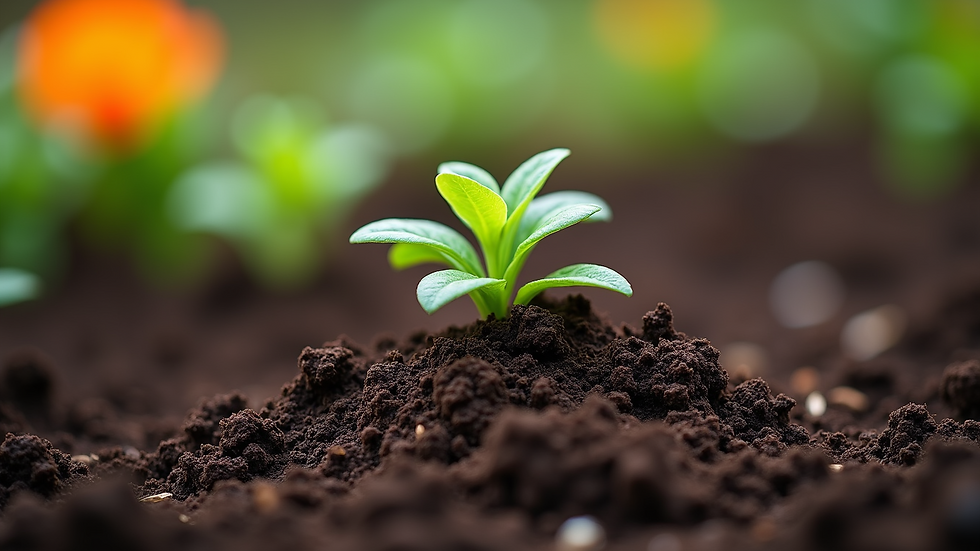Discover the Benefits of Organic Fertilizer for Your Garden
- Ange Bose

- Nov 10, 2025
- 4 min read
When I first started gardening, I was overwhelmed by all the choices for feeding my plants. Chemical fertilizers seemed quick and easy, but I quickly learned they weren’t the best for my soil or the environment. That’s when I discovered the magic of natural soil improvement tips and the power of using organic fertilizer. It’s been a game-changer for my garden, and I’m excited to share what I’ve learned with you.
Why Natural Soil Improvement Tips Matter
Healthy soil is the foundation of a thriving garden. Without it, plants struggle to grow, and pests and diseases can take over. Natural soil improvement tips focus on enriching the soil in ways that support long-term health and sustainability. This means feeding the soil, not just the plants.
One of the biggest benefits of improving soil naturally is that it encourages beneficial microorganisms. These tiny helpers break down organic matter, release nutrients, and improve soil structure. Over time, your soil becomes more fertile, better at retaining water, and less prone to erosion.
Here are some simple natural soil improvement tips I use regularly:
Add compost: It’s like a multivitamin for your soil. Compost adds organic matter and nutrients.
Use mulch: Mulching keeps moisture in and weeds out, plus it slowly breaks down to feed the soil.
Rotate crops: Changing what you plant in each spot prevents nutrient depletion and reduces pests.
Avoid over-tilling: Too much digging can harm soil structure and kill beneficial organisms.
These steps create a healthy environment where plants can thrive naturally.

How Organic Fertilizer Boosts Your Garden’s Health
One of the best ways to support natural soil improvement is by using organic fertilizer. Unlike synthetic options, organic fertilizers release nutrients slowly and improve soil quality over time. They’re made from natural materials like plant residues, animal manure, and minerals.
Here’s why I recommend organic fertilizer for any garden:
Sustained nutrient release: Plants get a steady supply of nutrients, reducing the risk of burning roots.
Improved soil structure: Organic matter helps soil hold water and air better.
Supports beneficial microbes: These fertilizers feed the microorganisms that keep soil healthy.
Environmentally friendly: They reduce chemical runoff and pollution.
For example, I use an organic fertilizer blend that includes composted manure and seaweed extracts. It’s gentle on my plants but powerful enough to boost growth and flowering. Plus, it fits perfectly with my goal of growing food and flowers sustainably.
If you’re curious, you can check out this organic fertilizer that I’ve found really effective.

Practical Tips for Using Organic Fertilizer in Your Garden
Using organic fertilizer isn’t complicated, but a few tips can help you get the best results:
Test your soil first: Knowing your soil’s nutrient levels helps you choose the right fertilizer.
Apply at the right time: Early spring and late fall are great times to feed your soil.
Follow package instructions: Organic fertilizers are safe but still need to be used correctly.
Combine with compost and mulch: This creates a nutrient-rich environment for your plants.
Water after applying: This helps nutrients soak into the soil and reach roots.
I like to sprinkle organic fertilizer around my vegetable beds and lightly work it into the topsoil. Then I add a layer of mulch to lock in moisture. Watching my tomatoes and herbs flourish after this simple routine is incredibly rewarding.
Common Questions About Organic Fertilizer
When I first switched to organic fertilizer, I had a few questions. Maybe you do too? Here are some answers that might help:
Will organic fertilizer work as fast as chemical fertilizer?
It usually takes a bit longer because nutrients release slowly. But the benefits last much longer.
Can I use organic fertilizer for all plants?
Yes! It’s safe for vegetables, flowers, shrubs, and even houseplants.
Is it more expensive?
Sometimes, but you use less over time because it improves soil health. Plus, it’s better for the environment.
How often should I apply it?
Typically, 2-3 times a year is enough, depending on your soil and plants.
If you’re ever unsure, local garden centers or online resources can offer advice tailored to your area and plants.
Growing a Greener Future with Organic Practices
Switching to organic fertilizer and natural soil improvement tips isn’t just about your garden today. It’s about building a healthier, more sustainable future. When you nurture your soil naturally, you’re helping reduce pollution, conserve water, and support biodiversity.
I love knowing that my garden is part of a bigger movement toward eco-friendly growing. Plus, the food tastes better, and the flowers bloom brighter. It’s a win-win.
If you want to start small, try adding compost or a bit of organic fertilizer to a few pots or a raised bed. You’ll see the difference quickly, and it might just inspire you to go all in.
Happy gardening!
If you want to explore more about organic fertilizer options, check out this organic fertilizer that I trust for quality and results. It’s a great step toward a thriving, natural garden.
































Comments